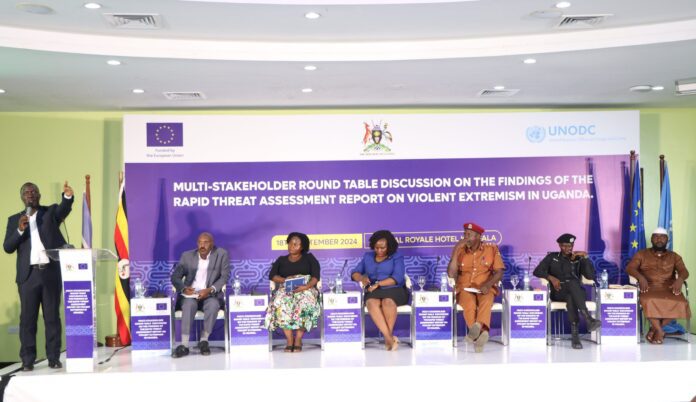
The government has emphasized its commitment to address terrorism and violet extremism, underscoring the crucial role of peace, security, and defense in achieving sustainable economic development and national unity.
The development was confirmed during a discussion of the findings of the Rapid Threat Assessment Report on Violent Extremism in Uganda at Imperial Royale, Kampala, on September 18, 2024.
The report by Professor Abdu Katende, the consultant leading the assessment, highlighted key trends in violent extremism, the vulnerabilities faced by at-risk communities, and recommendations for tailored responses to mitigate these threats.
According to the Permanent Secretary of the Ministry of Internal Affairs, Lt Gen Joseph Musanyufu, Uganda cannot have economic development if there is instability.
Musanyufu noted that the government has taken significant steps to combat terrorism and violent extremism, including the establishment of a National Counter Terrorism Centre to coordinate efforts against terrorism, involving all sectors of the government, and executing activities outlined in the Preventing and Countering Violent Extremism (PCVE) Strategy and Action Plan.
Referencing to the first attacks in Uganda in 1998, Musanyufu shared notable incidents such as the 1998 bombing of Kichwamba Technical College, where over 80 students were murdered. He reiterated the government’s commitment to collaborating with development partners and civil society organizations to promote sustainable peace and security for all Ugandans.
He also expressed appreciation for the collaborative efforts of the European Union (EU), the United Nations Office on Drugs and Crime (UNODC), and various other stakeholders in preventing and combating violent extremism in Uganda.
The United Nations Resident Coordinator in Uganda, Her Excellency Susan Namondo, observed that the UN recognizes violent extremism as a broader development issue intricately linked to inequality, poverty, and limited opportunities for young people.
She added that the UN’s comprehensive approach to tackling this challenge emphasizes human rights, social inclusion, youth empowerment, and gender equality.
Guillaume Chartrain, the deputy ambassador of the European Union in Uganda, stated that security challenges transcend borders and emphasized that terrorism remains a significant threat to international peace and security.
The event, organized by the Government of Uganda in partnership with the UNODC and funding from the EU, brought together over 100 key stakeholders, including representatives from government ministries, departments, agencies, civil society organizations, and religious leaders.
The report case study was carried out in 19 districts identified as high-risk communities for violent extremism: Kasese, Ntoroko, Bundibugyo, Kamwengye, Fort Portal, Gulu, Yumbe, Arua, Zombo, Nebbi, Namayingo, Mayuge, Jinja, Buyende, Iganga, Masaka, Lwengo, Kampala, and Wakiso.














